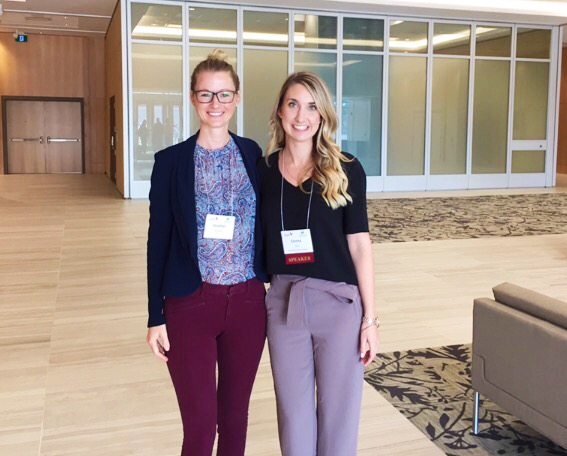Practice Collaboration, Not Competition
“Successful people find ways to expand their market and the value they bring to it; not shrink it”
A few months ago renowned strength and conditioning coach Brett Bartholomew wrote a blog post called “Cannibalizing Our Own: How Fear, Ego, and Insecurity Are Eroding Opportunities for Strength and Conditioning Coaches”. I highly encourage you to take a read of Brett’s writing as I found it highly applicable to not only strength and conditioning and physiotherapy, but also so much of the business world today.
Brett suggests we “Practice collaboration, not competition” in order to move our respective professions forward and I could not agree more. We need not engage in bickering about the details of our own singular successes, we simply need to engage with each other. We can easily transform our own success into another’s success.
This past weekend I was lucky enough to be a part of the Canadian Orthopeadic Division and Canadian Academy of Manipulative Physiotherapy (CAMPT) 2017 Orthopaedic National Symposium in my hometown of London, Ontario. Over 350 orthopaedic and manual physiotherapists came together from across the country to discuss, share and spend valuable face time with one another. The theme for the weekend was “Stronger Together” and certainly I came away inspired and motivated. It was a truly wonderful few days of learning and here are a few things I took away from it. Once again, though drawn from the field of physiotherapy, I imagine a lot of these take away points could be easily applied to most professions.
1. The people who do the dirty work don’t do it for the money or the recognition. They do it because they love and care about what they do.
Both the Orthopaedic Division and CAMPT were founded and now run on the work of volunteers. These organizations rely on hundreds of people every year to prepare educational programming, aid in teaching weekend courses, provide student mentorship and engage the public. Thousands of hours are put in every year and these volunteers do it because they want the organizations to continue to be successful.
No one is getting rich off being a part of these organizations, but I think it is the relationships formed through involvement that is the payout. The passion and comradery of these groups was palpable this weekend!
Bev Padfield, Alison Beaton and Golden Hands recipient Jackie Sadi. The Golden Hands Award of the National Orthopaedic Division is given in honour of David Lamb to an exceptional orthopaedic physiotherapist that exemplifies the commitment to the physiotherapy profession in manual therapy, education, mentorship and research.
Side note: I was so thrilled to see two AMAZING clinicians get some well-deserved recognition for their work in the field. Jackie Sadi and Laurie Urban were both recipients of the Golden Hand Award this year. Having worked with Jackie since the beginning of my career, I could not have been happier to be there to see her receive this award. Congrats to both of you and thank you for everything you have done for me and my colleagues!
2. We all need to care about the next generation no matter where we are in our own careers.
Looking around the room over the weekend, I saw some physiotherapy legends-Bev Padfield and Bert Chesworth to name a few- and I have been fortunate enough to personally benefit from their wisdom and guidance in my relatively short career. I also saw a lot of physiotherapy students and new physiotherapy graduates this weekend as well. Seeing them was a gentle reminder that I now have something to offer and need to ensure I pay it forward by continuing to foster mentorship within our field. I certainly do not have it all figured out yet, but should be putting myself in a position to help those coming up behind me.
3. There are several ways to get the job done. Keep your professional toolbox full and don’t ascribe to the same treatment for every patient and every condition.
Not once over the weekend did any speaker suggest a cookie cutter or one-size fits all treatment method. I felt everyone respected the skills of the clinicians in the room and the variety of skills brought to the table. This message was driven home by keynote speaker, Carol Kennedy, on Sunday morning during her talk on assessment and treatment of neck pain. Carol suggested that there are several ways to help someone rehabilitate and the key is knowing when and how to use your skills.
4. Our technical toolbox is important but we should not value technical skill over interpersonal skills.
Jas Dhir presenting the CARE model
The importance of working on and building therapeutic relationships with our patients was discussed on Saturday with the dynamic trio of Jas Dhir, Jim Millard and Dave Walton. I love that people are talking about the importance interpersonal skills in our profession! Part of the reason I became a physiotherapist was because I love connecting and learning about people! Their CARE model describes the need to connect, accept, respond and empower our patients. This is such an important aspect of any relationship and certainly something we all need to spend more time exploring.
5. Know who you work with, collaborate and stay in touch.
Heather McNeil, physiotherapist at Neumovement in Kelowna, BC.
There is so much value in having face time with other people in your profession. I feel so fortunate to have got to spend time with and have met so many wonderful people and physiotherapists this weekend! Some were old friends, some were social media friends and some were brand new friends, but I look forward to continuing to foster all of these relationships and cannot wait to see we are able to accomplish together!
Thank you to Dianna Moulden and the organizing committee for such a wonderful event! I would also like to thank the London Orthopaedic Unit for sponsoring my attendance at the 2017 Orthopaedic National Symposium.





